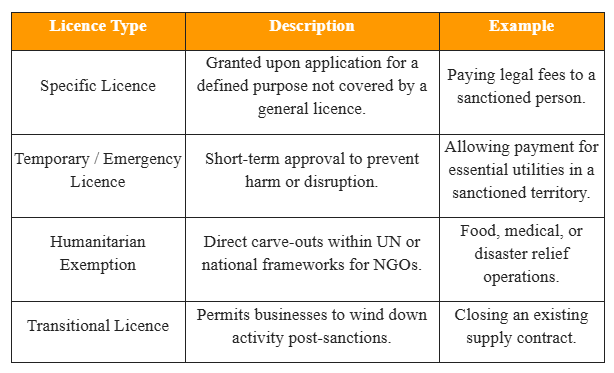🧭 Understanding Sanctions General Licences: What They Are and How They Work
COMPLIANCE TIPS & BEST PRACTICES
10/8/2025
Sanctions are among the most powerful tools used by governments and international bodies to promote international peace, deter illicit activity, and uphold human rights. But while sanctions restrict access to markets, trade, and finance, they can also inadvertently affect humanitarian operations and legitimate commerce. To manage this balance, regulators issue licences, these are permissions that allow certain activities otherwise prohibited under sanctions. Among these, General Licences are the most widely used and often misunderstood.
What Is a General Licence?
A General Licence (GL) is an authorisation issued by a sanctions authority that allows specific types of activities without requiring an individual application. In essence, if your planned activity fits within the terms and conditions of a general licence, you are already permitted to proceed, as long as you meet the stated requirements and recordkeeping obligations. General licences simplify compliance and enable legitimate activity to continue, especially for humanitarian, financial, or operational reasons.
Why Regulators Issue General Licences
General licences exist to ensure sanctions remain targeted and proportionate. They are not meant to punish civilians or block essential global flows. Common reasons for issuing general licences include:
Humanitarian support: Enabling NGOs to provide food, healthcare, and education in sanctioned regions.
Wind-down transactions: Allowing businesses to close out existing contracts after new sanctions are imposed.
Telecommunications and internet services: Supporting free access to information (e.g., social media platforms, communication tools).
Financial stability: Permitting limited dealings with sanctioned financial institutions to avoid global market disruption.
How Major Regulators Use General Licences
United States – Office of Foreign Assets Control (OFAC)
OFAC, part of the U.S. Treasury, operates one of the most comprehensive licensing systems globally.
General Licences: Cover a wide range of humanitarian, financial, and operational activities.
Example: General License 21 permits certain humanitarian activities in Syria.
Specific Licences: Issued case-by-case for activities not covered by a general licence (e.g., legal services, debt repayment).
View all current OFAC General Licences
OFAC’s approach emphasises compliance self-assessment, meaning the burden lies on organisations to determine if their activity fits within the terms.
United Kingdom – Office of Financial Sanctions Implementation (OFSI)
The UK’s OFSI, under HM Treasury, issues general licences under the Sanctions and Anti-Money Laundering Act 2018 (SAMLA).
Key features:
OFSI general licences support humanitarian aid, legal services, and financial services for sanctioned persons or territories.
The licences typically have a defined validity period and mandatory reporting obligations.
For example, OFSI issued a general licence in 2023 permitting limited payments linked to Russian energy transactions to ensure UK and European energy security.
European Union – European Commission & Member States
The EU system is unique — general licences are less centralised. Instead, EU Member States administer authorisations under EU Council Regulations.
Certain activities, such as medical exports or humanitarian transactions, may be covered by national general authorisations.
Others require specific authorisations from national competent authorities.
The EU also uses derogations — legal exceptions written directly into sanctions legislation that can be activated with state approval.
EU Sanctions Map – Authorisations and Derogations
Other Types of Sanctions Licences
Beyond general licences, regulators issue several other forms of authorisation:
Each type requires strict adherence to its conditions, and misuse can still result in penalties.
Case Study: Humanitarian Aid in Afghanistan
Following the Taliban’s takeover of Afghanistan in 2021, sweeping international sanctions threatened to halt aid delivery to millions.
To prevent humanitarian catastrophe:
OFAC issued General License 14, permitting NGOs and international organisations to deliver food, medicine, and educational support.
OFSI introduced a Humanitarian General Licence under its Afghanistan sanctions regime, allowing UK-based NGOs to operate without breaching financial sanctions.
The EU created a humanitarian exemption clause, enabling Member States to authorise essential support activities.
This coordinated effort ensured that while sanctions targeted the Taliban regime, ordinary Afghans could continue receiving critical humanitarian assistance.
Key Takeaways
General licences simplify compliance by allowing pre-approved activities.
They help balance legal enforcement and humanitarian necessity.
Each regulator (OFAC, OFSI, EU) applies unique frameworks, always check the relevant authority’s website.
Licences do not equal blanket permission, conditions and recordkeeping are critical.
Breaching licence terms still constitutes a sanctions violation.
Final Thought:
Sanctions compliance isn’t just about saying “no”, it’s about understanding where the law allows a lawful and ethical “yes.” General licences provide that flexibility, enabling businesses, banks, and humanitarian actors to operate responsibly even in highly sanctioned environments.
References:
OFAC General Licences – U.S. Department of the Treasury (US)
OFSI General Licences – UK HM Treasury (UK)
EU Sanctions Map – European Commission (EU)


Contact Us
📍 Dubai Digital Park, Dubai Silicon Oasis, Dubai, UAE
✉️ info@complysphereadvisory.com
© 2025 Comply Sphere Advisory FZCO
Licensed by Dubai International Free Zone Authority (IFZA) – License No. 67882
Providing consultancy, risk management, and professional training services within IFZA licensing scope.
Legal & Policies


